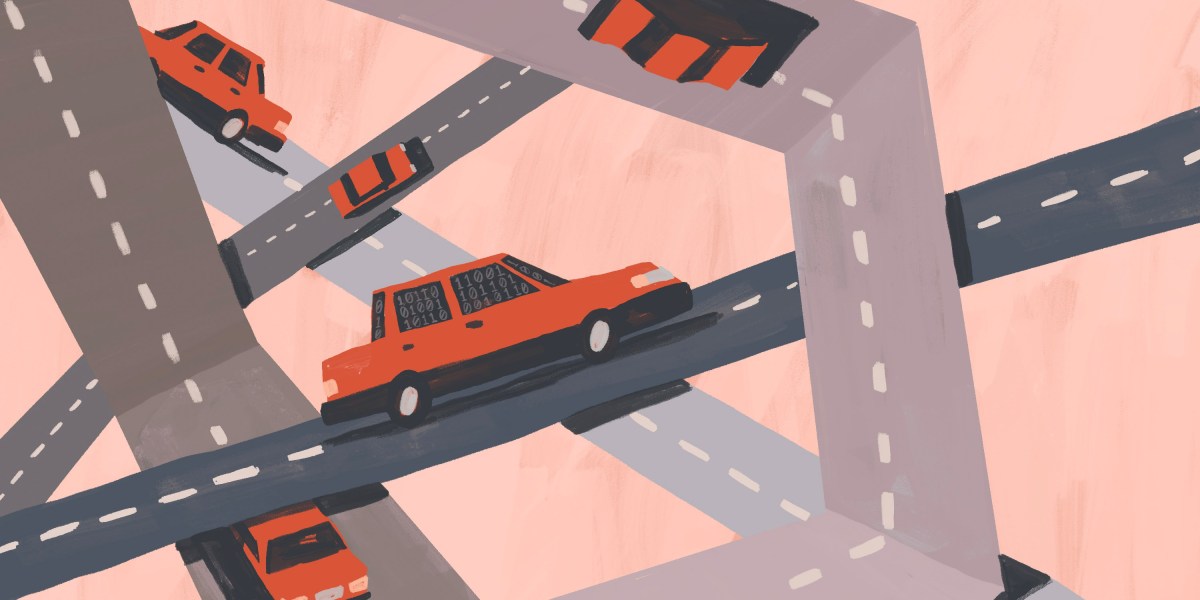The Download: Driverless cars’ AI plan, and stretching cells with a robotic shoulder
This is today’s edition of The Download, our weekday newsletter that provides a daily dose of what’s going on in the world of technology.
The big new idea for making self-driving cars that can go anywhere
Four years ago, Alex Kendall sat in a car on a small road in the British countryside and took his hands off the wheel. The car, equipped with a few cheap cameras and a massive neural network, veered towards the verge. When it did, Kendall grabbed the wheel for a few seconds to correct it. The car veered again; Kendall corrected it. It took less than 20 minutes for the car to learn to stay on the road by itself, he says.
This was the first time that reinforcement learning—an AI technique that trains a neural network to perform a task via trial and error—had been used to teach a car to drive from scratch on a real road. It was a small step in a new direction—one that a new generation of startups believe just might be the breakthrough that makes driverless cars an everyday reality.
Branding themselves AV2.0, these startups are betting that smarter, cheaper tech will let them overtake current market leaders. Indeed, Kendall’s firm Wayve says it wants to be the first company to deploy driverless cars in 100 different cities.
But is this yet more hype from an industry that’s been drinking its own Kool-Aid for years? Read the full story.
—Will Douglas Heaven
Watch a robotic shoulder practice twisting and stretching human cells
A robotic shoulder that stretches, presses, and twists lab-grown human tendon tissue could pave the way for more successful tissue grafts.
Though the field of tissue engineering is still mostly experimental, skin cells, cartilage, and even a windpipe grown from samples of human cells have been implanted in patients. But growing usable human tendon cells—which need to stretch and twist—has proved trickier.
Over the past two decades, scientists have encouraged engineered tendon cells and tissue to grow and mature by repeatedly stretching them in one direction. However, this approach has so far failed to produce fully functional tissue grafts that could be used in human bodies.
Humanoid robots could be used to make engineered tendon tissue that is more like the real thing. Read the full story—and watch the robot in action.
—Rhiannon Williams
The must-reads
I’ve combed the internet to find you today’s most fun/important/scary/fascinating stories about technology.
1 New privacy-focused apps are ill-equipped to cope with moderation demands
It makes maintaining the balance between privacy and policing more complicated. (WP $)
+ How to have honest conversations with children about the Texas shooting. (The Atlantic $)
2 Big Tech’s lobbying efforts are paying off
Democrats are wary of backing antitrust legislation for fear of losing their slim majority. (Politico)
+ Industry lobbyists have successfully weakened privacy regulation efforts, too. (The Markup)
+ What does breaking up Big Tech really mean? (MIT Technology Review)
3 The comforting sensation of touch is tough to replicate
But scientists are trying their best with sensors and prostheses. (National Geographic $)
+ Inventing soft things to solve hard problems. (MIT Technology Review)
4 Our obsession with restoring nature is unhelpful 
Living ecosystems are not meant to be static environments, so why do we treat them like they are? (New Statesman $)
+ “A Trillion Trees” is a great idea—that could become a dangerous climate distraction. (MIT Technology Review)
5 A Japanese toy company owns a stake in 4Chan
And sexualized anime figures could explain why. (Wired $)
+ The malicious rumor a trans person was responsible for the Texas shooting started on 4Chan. (Rolling Stone)
6 Students are afraid of being accused of cheating by an algorithm
Schools are placing too much trust in systems which can make flawed judgments. (NYT $)
7 How birth control could change in a post-Roe world
Including “night before” pills and sperm-prohibiting gels. (Neo.Life)
+ Data harvesting is likely to worsen if abortion is banned. (FT $)
+ Activists are helping Texans get access to abortion pills online. (MIT Technology Review)
8 Africa’s market traders are thriving thanks to supply chain startups
Enabling them to order products in bulk without having to travel. (FT $)
+ Major blockchain projects are flooding into the continent, too. (Quartz)
9 How to keep up with the news without getting overwhelmed
Turning off notifications is a good place to start. (WP $)
10 An AI has painted a disturbing portrait of the Queen
And critics are less than impressed with the result. (The Guardian)
+ The dark secret behind those cute AI-generated animal images. (MIT Technology Review)
The big story
Why you don’t really know what you know
October 2020
What does it really mean to know anything? How well can we understand the world when so much of our knowledge relies on evidence and argument provided by others?
These questions matter not only to scientists. Many other fields are becoming more complex, and we have access to far more information and informed opinions than ever before. Yet at the same time, increasing political polarization and misinformation are making it hard to know whom or what to trust. Read the full story.
—Matthew Hutson
We can still have nice things
A place for comfort, fun and distraction in these weird times. (Got any ideas? Drop me a line or tweet ’em at me.)
+ If I wasn’t excited enough for Jurassic World Dominion hitting movie theaters next month, this list of the top 20 dinosaur movies has tipped me over the edge.
+ The Sims’ answer to the Addams Family has been given a glamorous makeover.
+ There sure are a lot of monkeys scattered throughout the history of art.
+ An ambitious couple are hoping to eat their way around the world by recreating meals from every country—in alphabetical order.
+ This love letter to cities is a reminder of what’s great about urban living.




